In this article:
The skin on your face is thin and delicate, making it easier to damage. Thus, you must handle it with care and gentleness. Washing your face seems like a straightforward task, but not everyone does it right.
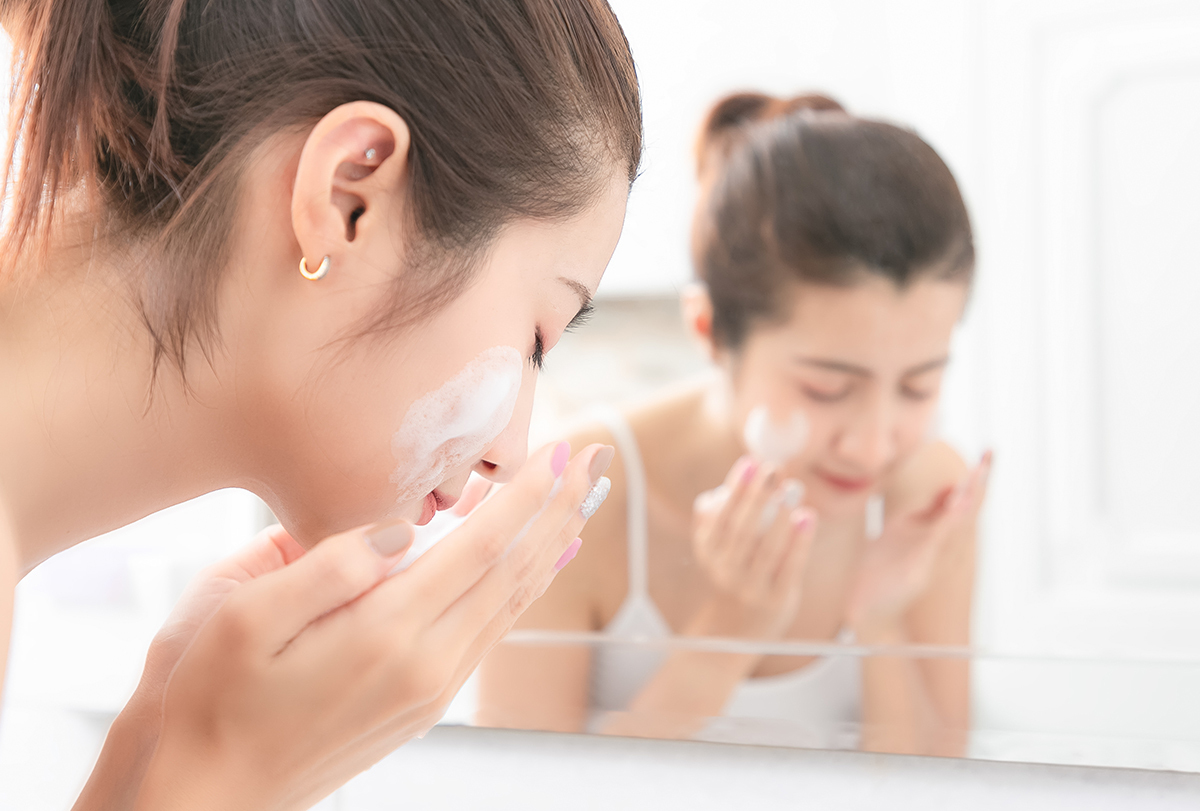
This article will list some basic mistakes related to face washing that can hamper your skin goals and explain the correct way to do it.
Common Face Washing Mistakes
Here are some major face-washing mistakes that you need to avoid:
1. Washing face with dirty hands
Your hands pick up a lot of germs and dirt by touching a variety of contaminated surfaces. If you use unclean hands to wash your face, all these contaminants will end up on your face, which can lead to infections.
So, it is crucial that you wash your hands before washing your face.
2. Excessive or prolonged face washing
If you wash your face too often or too long, the excessive exposure to water and soap can strip away the natural lipids from your skin, leaving it dry and irritated. (1)
It is recommended that you cleanse and wash your face at the beginning and end of the day as well as after profuse sweating.
3. Abrasive or excessive exfoliation
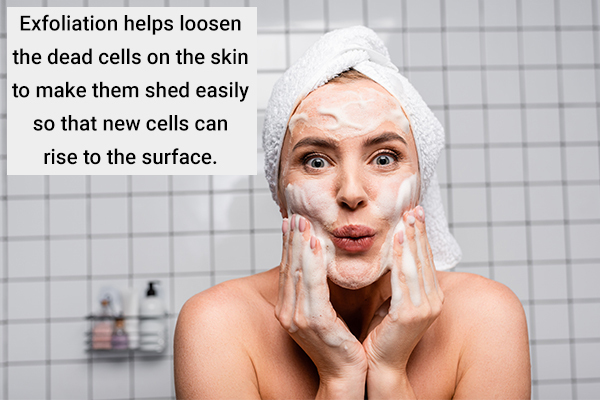
Exfoliation helps loosen the dead cells on the skin to make them shed easily so that new cells can rise to the surface. Besides promoting this skin renewal process, exfoliation also helps draw out the impurities settled deep in the pores to render your skin squeaky clean. (2)
However, for this step to bear the desired results, you must choose an exfoliating agent that suits your skin type. Avoid harsh products, and opt for mild and gentle scrubs or actives for your routine exfoliation.
Also, exfoliate only two or three times a week. The deep-cleansing effect of exfoliation tends to remove the natural moisture from your skin along with the excess sebum, leaving it quite dry.
Plus, the excessive use of chemical exfoliates or scrubs can physically damage the skin by creating microtears, which cause inflammation and irritation.
4. Washing your face with harsh soaps/cleansers
Soap and other skin-cleansing products contain chemical additives including parabens (preservatives), fragrance compounds, and sulfates (lathering agents) that can be too harsh on the skin.
Since you have to use cleansers regularly, often multiple times a day, the chemicals in them can strip the moisture from your skin and also damage its barrier structure over time. (3) Thus, it is recommended that you look through the composition list before buying your soap or cleanser.
Look for products that are devoid of these chemicals and contain more natural ingredients instead. Many different formulations are available on the market for different skin types. What works for one skin type may not work so well for another. So, do your research, ask your dermatologist if you want, and then make a decision.
If the cleanser you are using currently is making your skin dry, oily, or irritated, it’s time to switch to a new one. (4)
5. Not removing your makeup before washing
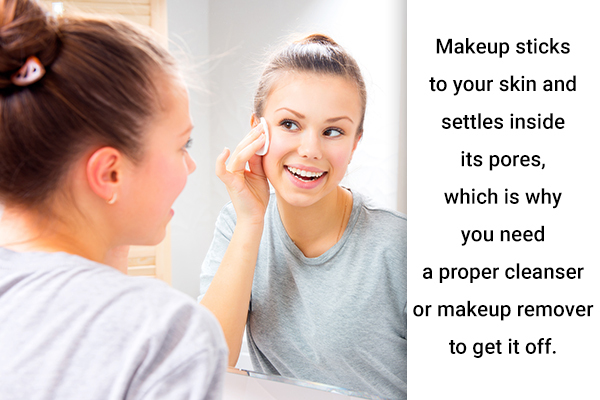
Makeup sticks to your skin and settles inside its pores, which is why you need a proper cleanser or makeup remover to get it off.
Directly washing it with water will still leave behind residue, especially since all cosmetics are designed to be water-resistant to some degree. So, first, gently wipe your makeup with a suitable cleanser, and then wash your skin.
6. Rinsing your face with hot water
Hot water is harsh for your skin in general, but especially for the delicate facial skin.
It removes the natural oils from your skin to make it utterly dry. It can break down the sensitive skin tissue to cause inflammation. Plus, it leaves your pores open to collect more grime and germs in the future.
It’s best to use lukewarm water for rinsing your face.
7. Not spending 60 seconds for cleansing
Don’t be in a rush when cleansing your face. You must gently massage the cleanser for at least a minute to properly remove the buildup of dead cells, dirt, sweat, and makeup from your skin.
The massaging motion helps to draw out the impurities from the pores, too. (5)
8. Using a dirty face towel
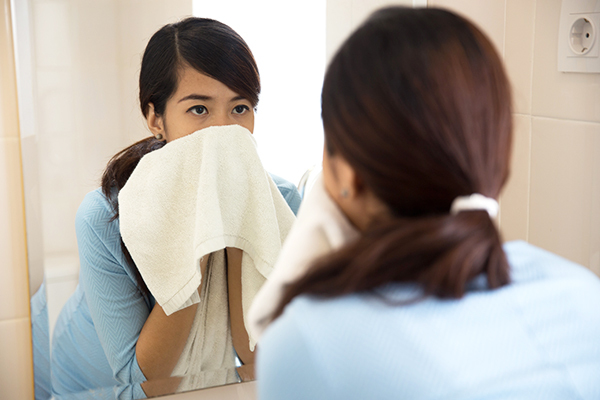
The towel that you use to dry your hair, your hands, and the rest of your body collects a lot of germs and impurities. So, it’s best not to use it on your face. Keep a separate face towel that is soft and only used by you.
Also, don’t rub it vigorously on your face as it can irritate or damage the skin. It will repeatedly tug at your fragile skin and break its connective fibers, making it loose and saggy over time.
What you need to do is lightly dab the towel on your face after washing to soak in the excess moisture.
9. Not moisturizing after cleansing
Cleansing, exfoliation, and washing are all drying for the skin, so it is important to moisturize it thereafter.
The correct time to apply a moisturizer is after pat drying your face when the skin is not soaking wet but still damp. This is because your cream or lotion will penetrate more swiftly into soft moist skin.
How to Wash Your Face Properly
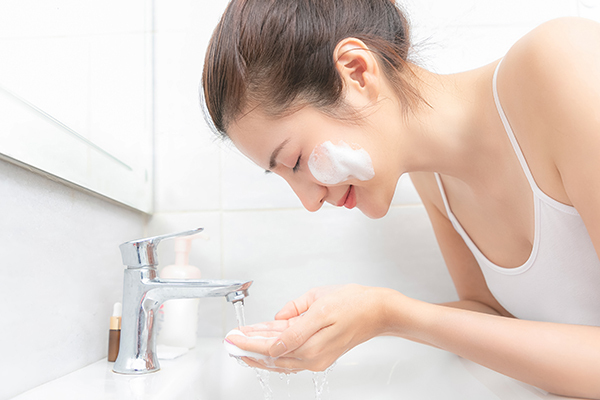
Here’s a quick step-by-step summary of the correct way to wash your face: (6)
- Use an alcohol-free cleanser that is gentle on the skin.
- Splash lukewarm water on your face, and then gently massage the cleanser onto your wet skin using circular finger motions for at least 1 minute. Avoid scrubbing the skin aggressively as this can cause irritation and damage.
- Rinse your skin with lukewarm water.
- Use a clean soft face towel to pat dry your skin, leaving it a little damp.
- Slather some moisturizer onto your moist skin.
Most-Asked Questions
How do I choose the right face cleansers?
Facial cleansers loosen the dead cells and other impurities accumulated on the skin to make them easier to wash off.
The market is flooded with many varieties of cleansers, but all of them don’t work the same. Some might suit your skin type better than the others. So, it is important to choose the best formulation for your particular skin type or problem.
Liquid cleansers can be of two types: oil-based or water-based. If you have oily or acne-prone skin, go for water-based cleansers, whereas if you have dry skin, oil-based ones are a better fit.
Cream cleansers have an oil-based formula and therefore hydrate the skin while also cleansing it. They are ideal for people with dry or sensitive skin. Gel cleansers are water based and therefore good for dry or acne-prone skin. Powder cleansers offer the dual benefits of skin cleansing and gentle exfoliation.
Clay cleansers help extract the excess sebum and other impurities from deep inside your skin pores while also providing a cool soothing effect. But they can also leave your skin a little dry in the process. So, they work better on oily, combination, or irritated skin but not on already dry skin.
Cleansing oils are yet another option that works well on both dry and oily skin. When massaged on the face, the excess sebum and impurities stick to the oil and are then easily rinsed off.
Can I just wash my face with water?
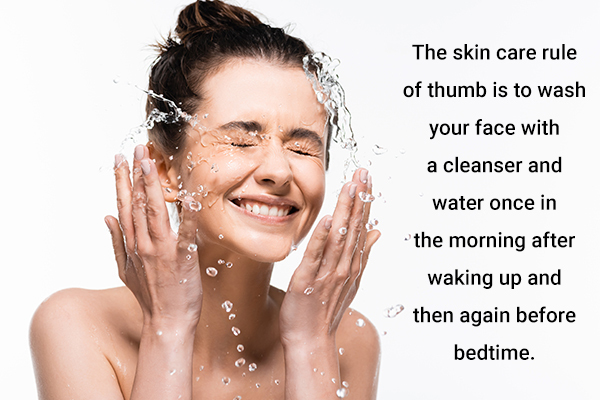
The skin care rule of thumb is to wash your face with a cleanser and water once in the morning after waking up and then again before bedtime.
But if you have extremely dry or sensitive skin, you must use a gentle cleanser a maximum of two times a day (morning and night) to properly remove the sebum, cellular debris, makeup, and other impurities that have settled on your skin. (7)
If the need arises to wash your face more often (such as after sweating and working out), then you can wash with only water.
Final Word
The skin is the outermost cover of the body that gets exposed to a lot of dust, pollutants, and various environmental irritants on a daily basis. (8)
It is a self-regenerating organ that sheds dead cells every day, but not all at once. Dead skin cells rise to the surface and are gradually sloughed off into the atmosphere. Not just that, the skin also produces its own oil or sebum that can settle on its surface.
The accumulation of these impurities on top of the skin gives it a dull appearance. If left unclean for a while, the grime, cellular debris, and sebum may clog your pores and pave the way for acne breakouts and other skin infections.
Thus, it is extremely important to cleanse your skin regularly so that it stays healthy and beautiful. In fact, this is the first step in any skin care regimen.
- Was this article helpful?
- YES, THANKS!NOT REALLY


